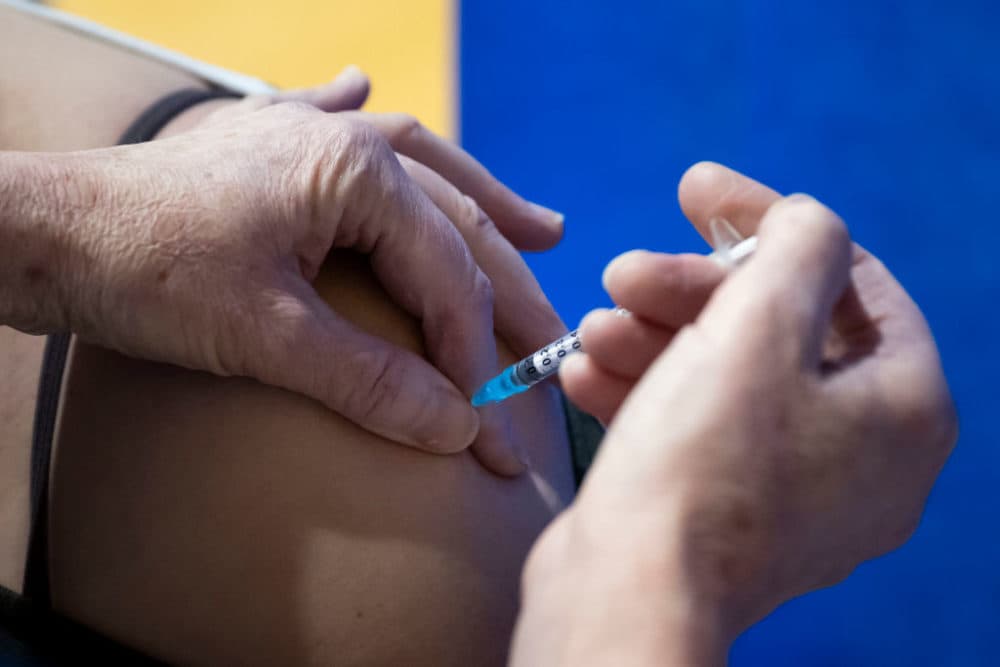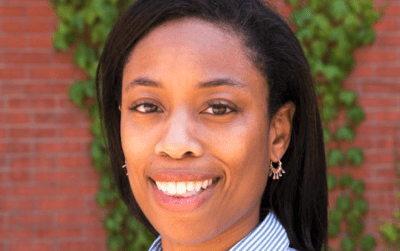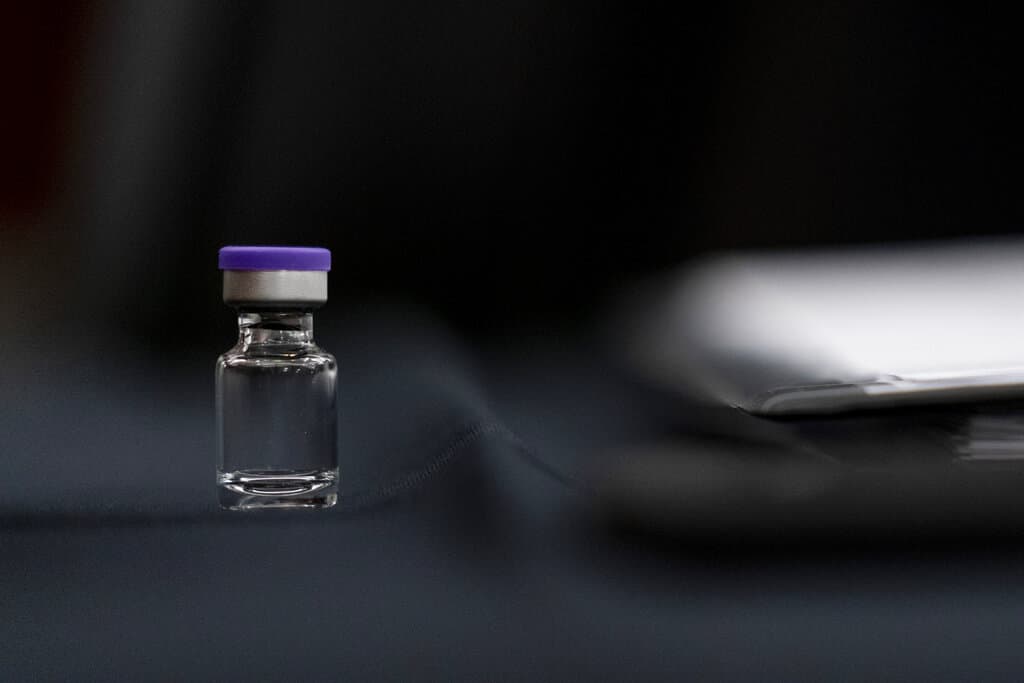Advertisement
With COVID-19 Vaccines On The Way, BMC Doctor Discusses Future Plans For Distribution

Now that the Food and Drug Administration has authorized emergency use of the first COVID-19 vaccine in the United States, health care workers will be among the first to get the vaccine.
Dr. Cassandra Pierre, an infectious disease physician at Boston Medical Center who serves as the acting hospital epidemiologist, joined WBUR's Sharon Brody to discuss when doses of the vaccine will arrive at Boston Medical Center, how the hospital plans to distribute the vaccine, and how health care workers are feeling about receiving the new vaccine.
Interview Highlights
On when Boston Medical Center will receive the vaccine and how many doses will be delivered:
Dr. Cassandra Pierre: So we are anticipating — very eagerly anticipating — that we will receive doses as soon as December the 14th or 15th. We're not entirely sure when we will receive it, but early in ... this week, and we are anticipating that we will receive sufficient doses for potentially up to maybe 2,000 or a little less of our health care personnel.
We have probably about, active on-site personnel, maybe 7,000 to 8,000 people, so it would only be a fraction of what we have in the hospital. But it will cover a great deal of the people who are frontline-facing, especially those who are actively caring for COVID-positive patients.

On vaccine availability for health care workers at Boston Medical Center who care directly for coronavirus-positive patients:
We do not anticipate that [frontline-facing health care workers will be unable to get the vaccine]. What we're actually anticipating is that not everyone will be able to get their dose — their vaccine — within the first week or two weeks. It might be a month. It might be two months to get everyone actively vaccinated. It really depends on how much we get up front. But we do anticipate that we will be able to sufficiently cover everyone who is frontline-facing, who is caring for patients — especially those who are caring for COVID-positive patients. I should say, we really want to get everyone who is caring for patients, period, covered in the next few months.
... But more than that, this is really about health care personnel, not just people who are providers or nurses. This is also very much about our support staff, certified nursing assistants, medical assistance, but also our environmental service workers, our food service workers. All of us have some risk of ... getting COVID, whether it's in the hospital or in the community setting. And it's incredibly important and equitable to ensure that all of our health care personnel — not just those who are actually caring for patients — are covered as well.
Advertisement
On concerns about the vaccine side effects and whether they might temporarily incapacitate some health care workers:
This is actually one of our biggest concerns. We know that — having looked at the data — the vaccine is safe. But up to maybe, even up to 50% of people combined in the Moderna and the Pfizer trials, have experienced these side effects, which are common among people who get vaccines in general.
[These side effects include] pain at the injection site of the vaccine, headaches, fatigue, maybe even up to fever. So it is concerning that these might potentially destabilize our workforce, not because of the severity of the symptoms by any means. We haven't seen any severe, adverse events yet. Of course, we're concerned about the severe allergy that has been reported in the UK. But other than that, we're not as concerned... The concern, obviously, is the overlap in between the symptoms, the adverse events that you could be seeing as a normal course of having received a vaccine, and symptoms for COVID. So that's the fever, the body aches, the fatigue. And so we have set up a system where ... we're... educating our staff, that if you develop a fever, if you develop maybe severe symptoms, we do want you to take some time off and we want you to get tested for COVID. So clearly that could quickly destabilize the workforce.
So in order to avoid that, hopefully, we are planning on staggering the doses. So not everyone in the same work group gets vaccinated at that certain time: that would be a recipe for disaster. [We're] trying to get people to get vaccinated right before they go off service or before the weekends so that people have time to recover and get over those side effects before they have to come back to work.
On hospital workers expressing some reluctance or anxiety about the vaccine:
You know, we did hear that in the weeks leading up to the results being released. And that is another issue and concern. You know, I think that the decision to vaccinate health care workers first is really essential for three reasons. I mean, obviously, we want to make sure that we maintain our health care worker force, that we preserve their safety and their health, that they don't become infected with COVID during this critical period when we need them to take care of our patients. We also want to make sure that our patients are aware this is a safe place to come. The majority of health care workers have been vaccinated. You are safe to come into the space. But the third important reason, that kind of gets to what you're talking about, is we want our health care workers to serve as both indirect and direct spokespeople for the safety and efficacy of this vaccine, to show Americans, "Yes, we believe in this so much that we ourselves are getting vaccinated to show you that it is safe and we believe in this." And part of that is making sure that we can promote vaccine confidence among our own health care workers.
So to mitigate any lingering concerns, we have had town halls where we've had both our CEO and then our chief medical officer talk about the safety, talk about the fact that they are going to be lining up themselves to get this vaccine. We have many leaders talking about this, but we're also going to be spotlighting vaccine trial participants. We have been a vaccine trial site for the Pfizer vaccine. And we are going to nurses, we're going to environmental service workers, food service workers, transport, to talk to people who have been vaccinated themselves as part of this trial.
Also just to talk to people who are interested and willing to get this. We're having town halls even among our sections. I'm going to be speaking to our clinic this coming week just to answer questions. This won't be in the vein of compelling people to get vaccinated by any means, but just letting them know what the data has been.
And just as a sidebar, we know that many of the people in the hospital, like myself, are Black or belong to Black and brown communities, belong to communities that have been marginalized. And so we reflect our patient population.
We want to make sure that we also can speak to the lived experience of [being] a part of a group that has been experimented on, who has been marginalized, that has been disenfranchised for medical care, but [who want] to ... ensure our safety — our own individual safety and the safety of our communities — and speak with knowledge, and speak with confidence to the fact that this is something that is going to safeguard our communities this year and for years to come.

On the most fair and helpful way to distribute the COVID-19 vaccine:
Yeah, I think this is something we've been struggling with. I think one of the things that we have been hoping to use to our advantage is this concept of a vulnerability index that the CDC has conceived and utilized to identify where the COVID-19 hot spots will be. So that social or community vulnerability index really refers to a set of factors that might leave a community vulnerable to COVID or really any other health disparities.
What is the density of housing in one area, are people living in multigenerational households? What are the percentage of people that work in the essential fields that mean that they cannot quarantine safely at home? What are the language barriers? What is the percentage of people who live below the poverty line?
We know the factors that put people at risk, not just for COVID, but for other kinds of chronic diseases and health disparities. How can we use that index to more effectively target those areas or those individuals who are going to really benefit the most? How can we maximize the benefit of this COVID vaccine by targeting it to people who are going to be most at risk for infection, hospitalization and death? So we're using that index. We're going to try to retrofit it into our model when it comes to distributing the vaccine through our community and looking not just at age, not just at medical co-morbidities — although we're certainly looking at those — but also the social and community vulnerability indexes to really target who needs that vaccine. And the expectation is that that formula will also target a very significant percentage of the Black and brown population that receive their care at our hospital.
This segment aired on December 12, 2020.

